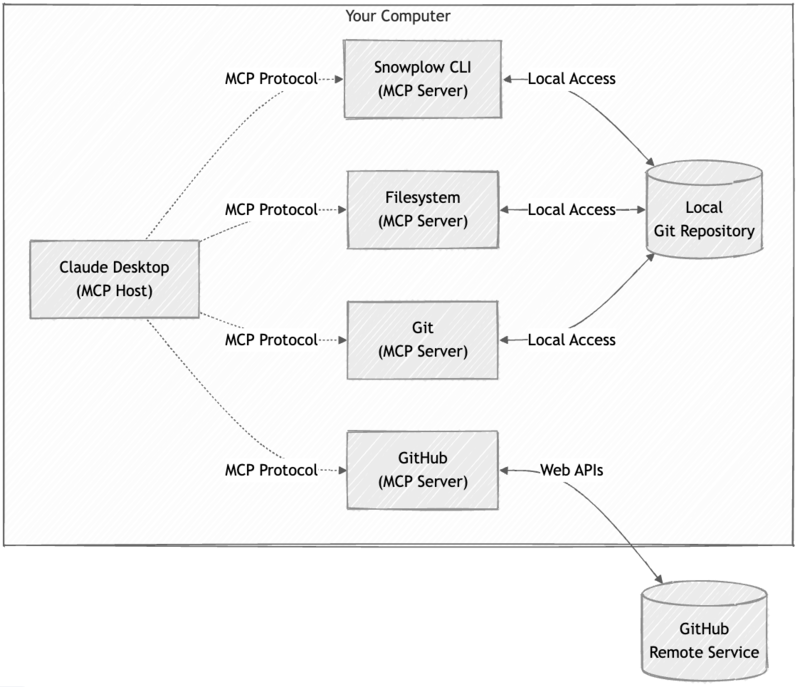Faster, Smarter Tracking Design with AI: Introducing Snowplow MCP Server
Today, we’re excited to introduce the Snowplow MCP Server for Tracking Design, a new tool that enables data engineers, product managers, and analysts to collaborate with AI to design future-proof Snowplow tracking faster.
The Snowplow MCP Server for Tracking Design uses the snowplow-cli, our command-line (CLI) tool and API to provide tools for validating and working with tracking plans and data structures to AIs. The tool also understands and recommends Snowplow tracking best practices, accelerating the tracking design process, and allowing new use-cases to be delivered faster.
The Challenge: From Months to Minutes
Consider this common scenario: your mobile e-commerce team identifies significant checkout drop-offs and needs to instrument detailed tracking across the entire funnel. Traditionally, this involves:
- Multiple stakeholder meetings to define requirements
- Manual schema design and validation
- Back-and-forth iterations between data and product teams
- Weeks or months before new tracking delivers insights
With the Snowplow MCP Server, this process transforms into a guided conversation with AI that delivers production-ready tracking designs in minutes, not months.
Introducing the Snowplow MCP Server For Tracking Design
The Snowplow MCP Server for Tracking Design integrates directly with your preferred AI tools, including Cursor and Claude. The solution integrates with these tools through the open Model Context Protocol (MCP), enabling you to design, validate, and iterate on tracking plans through natural conversation with AI.
Under the hood, the MCP Server uses the Snowplow CLI and API to provide tools for validating and working with tracking plans and data structures. The tool understands and recommends Snowplow tracking best practices, including our event-entity model and unstructured event patterns, ensuring your AI assistant creates high-quality, governed tracking designs.
What is MCP?
The Model Context Protocol (MCP) is an open standard that enables AI applications to securely connect with external data sources and tools. It allows AI agents, regardless of their specific LLM (e.g., Claude, GPT-4, Llama), to work with multiple services simultaneously through a standardized interface, providing them with the necessary context and capabilities to autonomously solve complex problems.
Key Capabilities:
- AI-Assisted Schema Generation: Describe your tracking needs in natural language and watch as AI creates comprehensive data structures and products
- Automatic Validation: Built-in validation against reduces errors and ensures best practices
- Intelligent Recommendations: AI suggests optimal tracking patterns based on your use case and preferences
- GitOps Integration: Seamlessly synchronizes with your existing Git-backed workflows and Snowplow Console sync processes
See It in Action: Mobile Checkout Flow
In our demo, we task an AI assistant with instrumenting a mobile checkout flow to understand drop-off points. The AI:
- Analyzes the existing setup by examining our GitHub repository and current tracking plans
- Proposes a comprehensive tracking plan leveraging Snowplow's standard e-commerce events for built-in funnel analysis
- Generates event schemas automatically while adding contextual entities like cart details and shipping information
- Self-corrects errors by referencing Snowplow documentation and web standards
- Creates a complete pull request ready for team review and deployment
As a result, you have a complete tracking implementation that captures not just the 'what' but the detailed 'how' and 'why' behind user behavior—delivered faster than manually writing a single schema.
Here's how this setup fits together in our example:

At the heart of our solution is an MCP Host (in this demo, Claude Desktop), which securely communicates via the MCP Protocol with specialized MCP Servers: the Snowplow CLI for data structure management, a Filesystem server for local file access, a Git server for local repository operations, and a GitHub server for remote Git interactions. This architecture allows your chosen AI agent to seamlessly interact with your code repository, manage data schemas, and integrate with your existing Git workflows.
Key Benefits for Data and Product Teams
- Accelerated Time-to-Value: Transform tracking design from a bottleneck into a competitive advantage. New use cases go from concept to instrumentation in minutes instead of months.
- Enhanced Data Quality: AI assistance ensures adherence to Snowplow best practices, creating more complete and actionable datasets that support analytics, ML, and operational use cases.
- Shift-Left Data Governance: Governance is built into the design process from inception, with automatic validation ensuring quality from day one.
- Democratized Tracking Design: Technical stakeholders can draft tracking plans directly, while data teams maintain oversight through standard review processes.
- Seamless Integration: Works with your existing GitOps workflows—the MCP Server creates and validates files locally, then syncs to Snowplow Console through regular CLI commands.
Getting Started
The Snowplow MCP Server for Tracking Design is available now as part of Event Studio for Snowplow CDI customers. The tool works upstream of your cloud infrastructure and is compatible with all Snowflake, Databricks, BigQuery, and streaming destinations.
To get started, you'll need:
- A Snowplow account with Event Studio enabled
- Your preferred MCP-compatible AI tool (Claude Desktop, Cursor, etc.)
- Basic tracking implementation (though you can use it for initial setup too)
Results appear in your Tracking Plans and Data Structures pages in Snowplow Console, with full integration into GitOps workflows through the Snowplow CLI.
To find out more, check out our complete tutorial or book a demo of Snowplow to learn more about this new functionality within our Event Studio.

